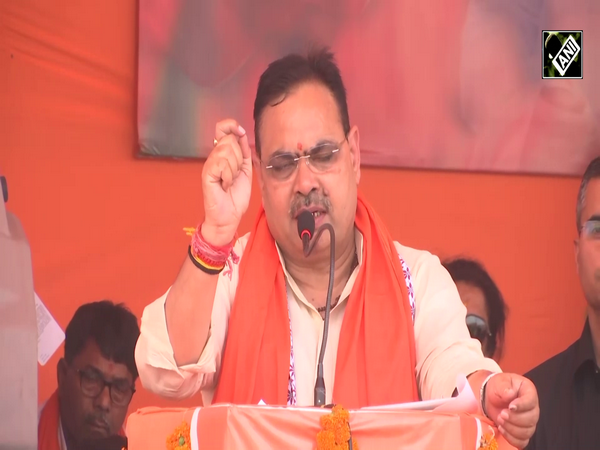Indian aviation enters golden period with new airports, hundreds of planes on order
Apr 04, 2023

New Delhi [India], April 4 : With new airports being inaugurated at a fast pace and airlines placing orders for planes in hundreds, India is set to be a global aviation hub. The Indian aviation industry, together with reliable industry players, is set to grow in both size and repute.
The air passenger volume of a country can be seen as an unofficial marker of the health of its economy and a reflection of its citizens' purchasing power. More travellers can indicates a stronger economy.
Thanks to India's strong economic foundation and policies, her aviation story, which began slowly, has now taken off and is flying at the highest altitude.
In a historic deal, Tata Sons-led Air India placed a massive order of 470 Boeing and Airbus aircraft last month to meet the sudden surge in the aviation demand of the country.
The deal, worth around USD 100 billion, comprises the purchase of a wide range of aircrafts that will cater to the needs of passengers across the economic ladder and of travelers around the world.
These deals with Boeing and Airspace were two of the biggest civil aviation deals the world has witnessed to date.
While commenting on the Air India and Boeing deal, US Department of State, Spokesperson Ned Price said, "It is an opportunity not only for the American economy and for workers here in this country, but it's an opportunity for Indian people as well, an opportunity to deepen a profoundly intertwined relationship based on shared interest, based on shared values, based on deep economic ties and with the announcement between India and Boeing yesterday those ties are all the deeper."
India is one of the most promising aviation markets in the world.
After a brief pandemic-induced lull in her aviation activity in 2020 and 2021, India resurged strongly in 2022, with a 47 per cent rise of air passenger traffic, totaling approximately 123 million people.
Market and consumer data specialist 'Statista', recorded that 22 million international passengers touched down at Indian airports in the Financial Year 2022.
India has around 400 airports and air strips, and of which, 153 were operational by the end of 2022.
The Indian aviation sector is projected to tread parallel to Indian economic growth in general, which is well placed to grow fastest amongst the major global economies in the next one decade.
The government's proactive measures such as capping air fares, coupled with a rapid expansion in budget airlines' fleets and a consistently growing middle income group in India have greatly contributed to the success of the Indian aviation sector.
India is also home to one of the most affordable air markets in the world.
These are some of the reasons that many experts around the world believe that Indian carriers can not only become a challenger to middle eastern carrier hegemony but can also surpass them to become the most preferred air carriers globally.
IndiGo, the biggest domestic air carrier, which flies nearly 1,800 flights a day, is also set to expand its fleet size. As many as 500 aircraft are on order and will join the IndiGo fleet soon.
Speaking about soon to be increased size of the aircraft size of IndiGo, Head of International Sales, IndiGo, Vinay Malhotra told ANI, "We are currently flying a little over 300 aircraft and we have a whopping 500 more on order. Currently we are flying 1,800 flights a day and 10 per cent of these flights are for international routes. Our current international flights are concentrated around the Indian sub-continent and some other countries around. The farthest that we are flying is to Istanbul in Tukey."
Global aviation advisory and research organization, CAPA, after its analysis of Indian aviation trends, projected a sharp uptick in India's international air passenger volume, which could reach around 115 million to 125 million by 2029-2030.
The domestic market is also projected to increase multifold in the near future.
The government's UDAN, or Ude Desh ka Aam Nagrik scheme, has proven highly successful in attracting and adding the country's middle class to air transportation.
The role of India's largest carrier, IndiGo, along with other domestic private players like Spicejet, cannot be understated for they, have made air travel accessible and affordable.
On the inauguration of Grenfield International Airport in Goa, Prime Minister Narendra Modi Prime Minister said, "Today India has become the third largest aviation market. The way Udaan Yojna has fulfilled the dreams of flying of the middle class is genuinely a case study topic for the academic world."
India has been working overtime to resume operations at airports in the country that were previously lying unserved or underserved.
The Airports Authority of India has added dozens of airports to India's domestic air network in less than one decade, which has singularly propelled a significant growth in India's domestic air travelers.
India is also on track to have some of the largest airports in the world in the immediate future. With the initial potential of catering up to 12 million people annually and the expansion potential of 60 million to 120 million passengers over a period next thirty years, Noida International Airport, in Delhi's satellite city, is expected to be operational by 2024.
"Number of airports is increasing, number of airlines is also going to increase. So our aviation industry which is growing at such a good speed is a beacon of hope to the entire world," said Airports Authority of India, Chairman Sanjiv Kumar.
A remarkable aviation journey, which is poised to grow further is an indication of India's general economic health.
Per capita income levels have registered a significant growth and a tremendous trajectory is predicted for the future as well.
The entirety of 'Brand India' is booming and as are her individual sectors.
Observers say India's aviation sector is one which will greatly promote her reputation around the world in years to come.

















